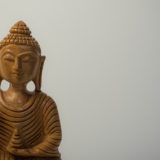Don’t be swayed by external circumstances. That’s the simple teaching of the 50th lojong slogan. Easier said than done, though, right?! As Norman Fischer says, “It’s always something.” Truly, there will always be some kind of reason for us to fall away from our practice. We…
What would it look like if you chose to attend to your resentment? That’s the inquiry behind the 49th lojong slogan. Traditionally, it reads, “Always meditate on whatever provokes resentment.” Now, why would we do a thing like that?! Well, because usually resentment arises at the…
It’s vital to include everything in mind training. Leave nothing out. Literally every single thing that happens to you- everything you think, experience, or observe- can help you grow. And in fact, one of the best gifts of lojong mind training is that it helps us…
The 47th lojong slogan teaches us to keep the three inseparable. These three are body, speech, and mind. In other words, live integrated. The teachings often refer to them as the three gates, because they’re the three ways we interact with the world. Traleg Kyabgon writes,…
Norman Fischer simply translates this slogan as: don’t lose track. As a continuation of the 45th lojong slogan “Take on the three principle causes,” the 46th adds, “Pay heed that the three never wane.” In other words, keep it up! So first, pay heed that you…
Take on the three principle causes. These are like three ingredients we need to do this work well. The first is having a spiritual friend or teacher. It’s interesting that while many of the commentaries mention a guru here, the earliest teachings refer to a kalyanamitra,…
The 44th lojong slogan is “Train in the three difficulties.” The first is noticing where you get neurotic. Second, you decide not to respond in the usual way. And third, you continue practicing this little dance. I like this slogan because it’s a nice little summary…
The 43rd lojong slogan says, “Observe these two, even at the risk of your life.” The two are the vows Buddhists take- the refuge vow and the bodhisattva vow. In the refuge vow, a person chooses to take refuge in the Buddha, the teachings of the…
Well this one’s simple, even if it isn’t easy: whatever happens, be patient. That’s the reason we practice mind training, right? So that we don’t get tossed around by the ups and downs of the day? Well, this is that, in a nutshell. Traditionally the lojong…
Here’s a simple spiritual practice: begin and end the day with intention. That’s the message behind the 41st lojong slogan. It says, “Two activities: one at the beginning, one at the end.” That activity is bringing to mind our desire to be a bodhicitta today. And…











